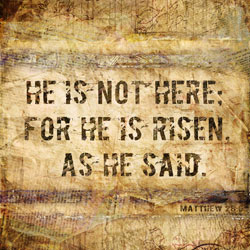Contributed by Brian Hiortdahl, Overland Park, KS
Warm-up Question
What scares you?
Confused, Scared, and Depressed
Alex Hribal, a sophomore at Franklin Regional High School in Murrysville, Pennsylvania, sits in custody after a recent rampage during which he stabbed multiple people at his school with kitchen knives. Hribal’s attorney describes him as “confused, scared, and depressed.”
Discussion Questions
- Do you feel any sympathy for Alex? Why or why not?
- What do you think is the best strategy for keeping schools safe from violence? What role do students play in school safety?
- Could something unthinkable like this happen in a church youth group setting? Why or why not?
Scripture Texts (NRSV) for Sunday, April 27, 2014 (Second Sunday of Easter)
(Text links are to Oremus Bible Browser. Oremus Bible Browser is not affiliated with or supported by the Evangelical Lutheran Church in America. You can find the calendar of readings for Year C at Lectionary Readings.)
For lectionary humor and insight, check the weekly comic Agnus Day.
Gospel Reflection
 The gospel writer John presents the disciples looking just like Alex Hribal: confused, scared, and depressed. Their doors are locked in fear. No doubt the authorities know that they are tied to Jesus, a criminal perceived to be so dangerous that he had to receive the death penalty. As his known accomplices, the disciples are likely targets of some form of crackdown, especially now that a rumor is going around that Jesus has risen from the dead and is alive again.
The gospel writer John presents the disciples looking just like Alex Hribal: confused, scared, and depressed. Their doors are locked in fear. No doubt the authorities know that they are tied to Jesus, a criminal perceived to be so dangerous that he had to receive the death penalty. As his known accomplices, the disciples are likely targets of some form of crackdown, especially now that a rumor is going around that Jesus has risen from the dead and is alive again.
They also have reason to fear Jesus himself. Most of them had denied him if not also betrayed him, running away and abandoning him in his darkest hour. Will he confront them with their failure? Will they have to answer to him for their terrible moment of disloyalty and cowardice?
The stone door of the tomb couldn’t keep Jesus in, and the locks on the disciples’ doors couldn’t keep him out. He did confront them…with words of surprising grace. Peace be with you, he said. Then he showed them where he himself had been stabbed.
After this, he gave them his Spirit and a new mission: forgiveness. They were given the responsibility of giving to the world exactly what he had given them. He is essentially reframing his commandment to love one another. Just as I have loved you, you also should love one another. One characteristic of this complete love is that it casts out fear. (See John 13:34 and 1 John 4:18.) Forgiveness banishes all of the brokenness in relationships (guilt, shame, distrust, fear, isolation), making those relationships safe enough that love can be possible and complete again, and hearts can live in peace.
This mission is tested immediately with Thomas, who was not present for the meeting. Would they retaliate against him because he did not trust them? Would they punish Thomas somehow for failing to believe their (rather unbelievable) news about seeing Jesus? Or would they forgive him and include him in sharing the gift of peace they have just received from Christ’s open, wounded hands?
Discussion Questions
- Can Alex Hribal be forgiven by his victims? Should he be? What do you think Jesus would say to him?
- Do people fear Jesus and/or His church? Why? What can be done about it?
- Who is missing from your groups—at church, at school, at parties? How can you break through their isolation with good news and include them?
Activity Suggestions
Identify someone you know who appears misunderstood, someone who seems to need more love and peace and compassion. Pray for them. Befriend them. Invite them to accompany you at youth group or another social gathering.
Closing Prayer
God of second chances, we praise you for the resurrection of Jesus and his appearance to his frightened disciples. Visit us with your peace and power. Forgive us the ways in which we have wronged you and strengthen us to forgive others. Replace our fears with faith and love and joy. Bring all this bleeding world from death to life, in Jesus’ name. Amen




